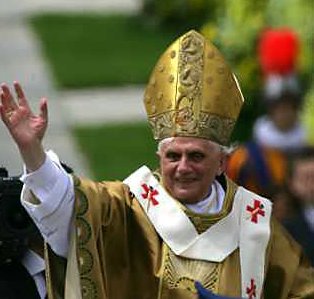On the Twenty-Eighth Sunday Per Annum

Isaiah 25:6-10
On this mountain
the Lord of hosts will make for all peoples
a feast of rich food,
a feast of well-matured wines,
of rich food filled with marrow,
of well-matured wines strained clear.
And he will destroy on this mountain
the shroud that is cast over all peoples,
the sheet that is spread over all nations;
he will swallow up death for ever.
Then the Lord God will wipe away the tears from all faces,
and the disgrace of his people he will take away from all the earth,
for the Lord has spoken.
It will be said on that day,
Lo, this is our God; we have waited for him, so that he might save us.
This is the Lord for whom we have waited;
let us be glad and rejoice in his salvation.
For the hand of the Lord will rest on this mountain.
The Chapter continues:
The Moabites shall be trodden down in their place
as straw is trodden down in a dung-pit.
Though they spread out their hands in the midst of it,
as swimmers spread out their hands to swim,
their pride will be laid low
despite the struggle of their hands.
The high fortifications of his walls will be brought down,
laid low, cast to the ground, even to the dust.
Matthew 22 : 1-14
Once more Jesus spoke to them in parables, saying: ‘The kingdom of heaven may be compared to a king who gave a wedding banquet for his son. He sent his slaves to call those who had been invited to the wedding banquet, but they would not come. Again he sent other slaves, saying, “Tell those who have been invited: Look, I have prepared my dinner, my oxen and my fat calves have been slaughtered, and everything is ready; come to the wedding banquet.” But they made light of it and went away, one to his farm, another to his business, while the rest seized his slaves, maltreated them, and killed them. The king was enraged. He sent his troops, destroyed those murderers, and burned their city. Then he said to his slaves, “The wedding is ready, but those invited were not worthy. Go therefore into the main streets, and invite everyone you find to the wedding banquet.” Those slaves went out into the streets and gathered all whom they found, both good and bad; so the wedding hall was filled with guests.
‘But when the king came in to see the guests, he noticed a man there who was not wearing a wedding robe, and he said to him, “Friend, how did you get in here without a wedding robe?” And he was speechless. Then the king said to the attendants, “Bind him hand and foot, and throw him into the outer darkness, where there will be weeping and gnashing of teeth.” For many are called, but few are chosen.’
This parable is, of course, a great stumbling block for me as a Fat White Lazy Bastard Mean-Spirited Queer Boy. From my earliest childhood, or at the very least my earliest years within the faith, I have read or heard this story of a King : Disappointed by the rejection of his subjects, this King commands his servants to troll the streets of the City in order to dragoon passers-by into his Wedding Feast ; he then confronts a guest who is not properly dressed. When the man has no answer-to-power, I mean how could he, he's just been Shanghaied, he gets roughed-up some more and thrown into the outer darkness.
I find this passage to be full of mixed messages. First, you've got this King who has made some pretty poor connections with his friends, associates, clients, subjects to the degree that they beg off the wedding feast for his son. Is this son a philanderer? Is the King a tyrant? A hated puppet of a hated enemy? Whoever this King is, enraged he killed them and burned their city! Then, he sends his slaves out into the city streets . . .
Are we supposed to read into this passage the perfidy of the Jews, a stern but subtle warning of our own willful back-slidedness, or find a condemnation of the apostasy of Hypocrites or Protestants? Are we supposed to find a loving King who, once rejected by his faithless subjects, finds new quests for his banquet.
I get that God can be legitimately portrayed as a kick-ass kind of guy, but is this an image of God, God's Kingdom, God's mercy that fills a sinner's heart with trust? The good and the bad are brought into the Feast, but where, exactly, are the tax collectors and the prostitutes in this story, did they just happen to be wearing wedding garments as they promenaded through the streets?
What, exactly is the Wedding Garment mentioned in the story? Is it Conversion, Perfect Obedience to the Father's Will, thinking with the mind of the Church? How is it that this man has failed to have a Wedding Garment? What is this damning silence? [And in the moment of confrontation and judgment, if I am silent, how is it that Christ is not my Advocate?] How is it that this King should cast this man out rather than to be his neighbor, salve his wounds, clothe his nakedness--the fatted calf is already slain?
Is Baptism going to be enough to save me from that outer darkness and all that gnashing of teeth? Did Jesus die for me or just for the well-dressed and well-behaved pretty boys who hang out in the market just waiting to be picked up?
In near despair I call out in the words of Paul Stookey, made famous by Peter, Paul, and Mary:
Jesus!, Is that what the gnashing of teeth sounds like?
Well early in the morning, about the break of day,
I ask the Lord, "Help me find the way!"
Help me find the way to the promised land
This lonely body needs a helping hand
I ask the Lord to help me please find the way.
When the new day's a dawning, I bow my head in prayer.
I pray to the Lord, "Won't you lead me there?"
Won't you guide me safely to the Golden Stair?
Won't you let this body your burden share?
I pray to the Lord, "Won't you lead me please, lead me there?"
When the judgment comes to find the world in shame
When the trumpet blows won't you call my name?
When the thunder rolls and the heavens rain
When the sun turns black, never shine again
When the trumpet blows, won't you call me please, call my name!






